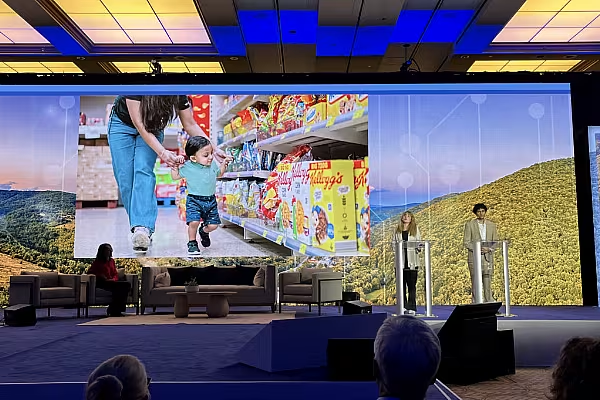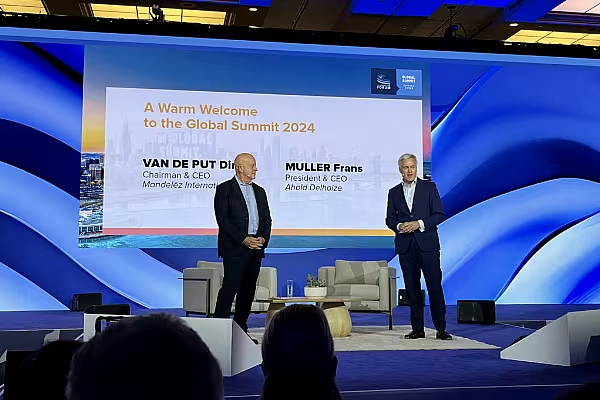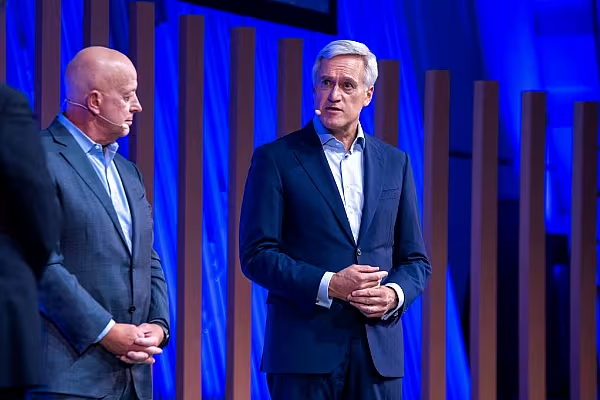The previous evening's L'Oréal Gala Dinner, which featured an appearance by music legend Gloria Gaynor, didn't deter attendees from making an early start to Day Two of The Consumer Goods Forum Global Summit in Chicago, which kicked off with a trio of business breakfasts, hosted by Bel Group's Cécile Beliot-Zind; Colleen Wegman, Wegmans, and Frans Muller, Ahold Delhaize; and Minsok Pak of CJ CheilJedang Food, respectively.
The opening plenary session of the day was an insightful fireside chat between Tony Xu, CEO of DoorDash and Wai-Chan Chan, managing director of The Consumer Goods Forum, before a dive-in on the topic of 'Navigating Human Rights Due Diligence in Today's Business Landscape' saw Nathalie Roos, CEO of Lipton Teas and Infusions address the critical role of human rights in business success.
Roos highlighted the need for authentic, transparent business practices, especially in sectors like tea production, where creating shared value is essential. She underscored that Gen Z demands immediate action and accountability, urging companies to prioritise social measures and sustainability to meet the expectations of the next generation of consumers.
"Gen Z are more than just a statistic – they are forerunners of change and the champions of progress," she explained.
Elsewhere, Carlos Abrams-Rivera, CEO of The Kraft Heinz Company, discussed the company's global transformation and vision for the future, highlighting how how culture serves as a competitive advantage, and emphasising the importance of aligning the company’s operations with consumer needs and market trends.
A novel special session on the topic of 'Beyond Plastic - Impact through Collaboration', saw Rina Ladva from PA Consulting, Tony Perrotta, Claudine Patel of Sanofi Consumer Healthcare, Michael Goltzman from The Coca-Cola Company, and Allison Lin of Mars discuss the challenges of scaling alternatives to plastic, leveraging industry collaboration to deliver impactful results, and the potential for global brands to lead the charge in adopting non-plastic solutions at a commercial scale.
Voice Of The Future
One of the undoubted highlights of the day was the return of the Bite Back 2030 youth activist organisation to the Summit stage, as Molly Lewis and Dev Sharma highlighted the pervasive issue of junk food marketing and its impact on youth health.
Aged 17 and 19, respectively, Lewis and Sharma called for significant changes from the food industry, including commitments to healthier products and marketing practices. They urged companies to consider health with the same seriousness as climate change, suggesting the creation of Chief Health Officer roles to drive these initiatives – "you need to think about health the way you think about climate," Sharma told the CGF delegates.
Adding that her generation lives "under constant bombardment" from junk food advertising, Lewis added that the companies at the Summit "have the toolkit to mend this broken food system", if the will is there.
Next up, Jessica Moulton from McKinsey & Company, Richard Taylor from Jefferies, Ben Frost from Goldman Sachs, and Gonzalve Bich, CEO of BiC, discussed the shifting landscape of consumer goods and retail. They noted that the classic consumer goods model has struggled since the 2010s, with growth hampered by macroeconomic challenges, consumer fragmentation, and volatile costs.
The discussion highlighted the need for companies to focus on consumer requirements, personalisation, and strategic innovation to stay competitive.
"It's never been more important to scale commercial excellence," said McKinsey's Moulton, adding that a "marketing revolution" is now under way, which the industry needs to lead on.
Forest Positive
An afternoon session featuring Carine Kraus from Carrefour and Lauren Richardson from Colgate-Palmolive explored the importance of forest-positive practices in corporate sustainability. Both stressed the need for ongoing adaptation to consumer and environmental priorities, emphasising pragmatic action plans and strong KPI management.
As Kraus put it, businesses have many choices to make when it comes to areas such as net zero commitments, but on tackling deforestation, "you have no choice", with a forest positive approach fundamental to ensuring business growth.
In terms of the skills needed to achieve this, meanwhile, as Richardson put it, "I've used the words 'agile' and 'resilient' more in the last five years than at any other point in my career", adding that a holistic, nimble approach to risk management is essential.














